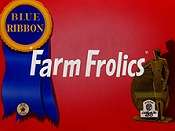Farm Frolics
| Farm Frolics | |
|---|---|
| Merrie Melodies series | |
 1949 Blue Ribbon reissue title card | |
| Directed by | Robert Clampett |
| Produced by | Leon Schlesinger |
| Story by | Warren Foster[1] |
| Narrated by | Robert C. Bruce |
| Voices by |
Mel Blanc Sara Berner Cliff Nazarro Kent Rogers |
| Music by | Carl W. Stalling |
| Studio | Leon Schlesinger Studios |
| Distributed by | Warner Bros. Pictures |
| Release date(s) | May 10, 1941 |
| Color process | Technicolor |
| Running time | 7 Min. |
| Language | English |
Farm Frolics is a 1941 Warner Bros. cartoon in the Merrie Melodies series. It was directed by Bob Clampett, animation by Rob Scribner, and musical direction by Carl Stalling. The vocal group heard at the beginning is the Sportsmen Quartet, who often harmonized in Warner Bros. cartoons of the period, later becoming the resident singing group on Jack Benny's radio and TV shows. It is also on 50 Classic Cartoons Volume 3.
Plot synopsis
The cartoon starts with the arm of an animator drawing a farm scene. The farm scene then colors itself, and the camera zooms in just as the plot follows:
- A realistic-looking horse is seen, whinnying (courtesy of Mel Blanc), and a comic triple plays out: The narrator asks the horse to do a trot; the horse obliges. The narrator asks for a gallop; the horse again obliges. The narrator then asks the horse to do a "canter". The horse turns from realistic to a cartoon horse, with the bugged eyes of, and singing "I'm Happy About the Whole Thing" (by Harry Warren and Johnny Mercer) in the style of, the vaudeville star Eddie Cantor, vocally impersonated by Kent Rogers. The narrator admonishes the horse, which grins sheepishly.
- The family dog is seen lazing on the porch, springing to alertness when the newspaper arrives. The dog makes a mad dash to the end of the driveway, gets the paper, comes back to the porch, and immediately starts to read the paper himself, starting with the Sunday comics. He turns to the audience, and says, "I can hardly wait to see what happened to Dick Tracy!" (This gag would be used by Clampett again in The Great Piggy Bank Robbery.)
- A hen leaves her eggs unguarded, and a mean-looking weasel stealthily creeps into the henhouse while the narrator frets. Just as he is about to grab the eggs, they all hatch at once, and the chicks shout "BOO!" in unison. The frightened weasel evokes a Joe Penner catch-phrase, "Don't ever DOOO that!" and gasps as his heart pounds.
- An owl is hooting dully until it briefly smiles while saying "Who's Yehoodi?"
- A few birds put a little twig, a bit of string, and piece of straw until they make a house approved by the Federal Housing Administration, singing, "There's no place like home!"
- A worried field mouse with huge ears is asked about what worries him; he claims "I don't know, Doc. I...I just keep hearing things."
- A group of ants is seen coming and going at an anthill. The camera and mike zoom in to allow the viewer to see and hear as a mother summons her son: "Hen-REEEE!" "Coming, Mother!" (referring to the catchphrase from the radio show, "The Aldrich Family").
- A mouse mentions that he is kind to the cat against which he is snuggling, and nods with the narrator's observation that they are friends. When asked by the narrator if he has anything he would like to say to his friends in the audience, the mouse yells, "GET ME OUT OF HEEEEEEEEERE!!!!!!!!!", then escapes. A brief circle-around chase ensues, then ends with the cat catching the mouse, then returning to the snuggling. The mouse shrugs.
- A recurring gag, it has six piglets eagerly watching an alarm clock. When it finally hits 6:00 pm, one of the pigs yells "Dinnertime!" and they dash off to their mother, to the tune of the military bugle call "Mess Call". She braces for the onslaught as the sucklings pile into her side. Zooming in on the mother pig's rather dejected face, she speaks to the audience in the manner of ZaSu Pitts: "Oh, dear... every day, it's the same thing!" Iris-out.
History
This is one of the cartoons that Warner would occasionally produce that featured none of its stable of characters, just a series of gags, usually based on outrageous stereotypes and plays on words, and topical references, as a narrator (Robert C. Bruce) describes the action. The dog was spotted in 1988's Who Framed Roger Rabbit toward the final scene.
See also
References
- ↑ Farm Frolics at the Big Cartoon DataBase